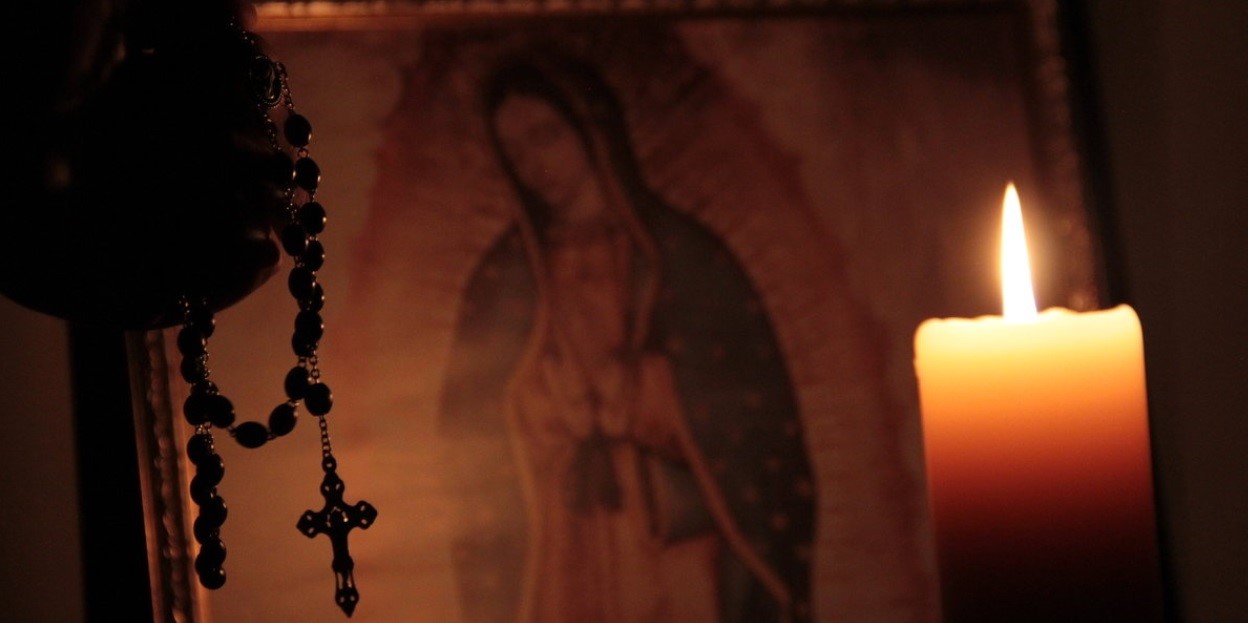Devotion common in Latin American countries has become an evangelizing mission and sign of hope for families of St. Gabriel Parish
DETROIT — From St. Gabriel Parish in southwest Detroit, the Virgin of Guadalupe makes her pilgrimage to the homes of area families. Sometimes she stays for only a short time, but her impact on the hearts and minds of Detroit-area Catholics is much greater than that.
The predominantly Spanish-speaking parish has celebrated the devotion — sometimes known as the “Pilgrim Virgin” — for several years. Since then, it’s brought peace, health and love to the homes of Hispanic Catholics who gather as a family to pray the holy rosary before the visit of the statue of the Virgin Morena in their homes.
Carmen Barba, who coordinates the visits for St. Gabriel Parish, never imagined the devotion would grow as it has. While common in many Spanish-speaking countries, few parishes in the Detroit area practice the devotion.
Families who wish to host the Virgin receive a blessing from the parish priest, Fr. Kevin Roelant, and agree to pray the rosary each day for the needs of the community and family.
"Families with needs are sought after Sunday Mass," Barba told Detroit Catholic en Espanol, before this story was translated into English. "They have to return the image the following Sunday. The image is also shared and promoted so that the different groups at St. Gabriel receive it at home."

Typically, Barba said, families who host the statue have needs, difficulties or struggles for which they pray, such as a family member who has been detained by immigration officials, or employment or health struggles. The Virgin helps comfort and sustain the family, she said.
Often, families who host the Pilgrim Virgin grow a closer devotion to Our Lady of Guadalupe, including to the rosary.
“If they do not know how to pray the holy rosary, we are willing to go to their homes and we teach and pray with them, but many times they may feel sorry that we visit them or they do not feel comfortable, so I give them some books,” Barba said. “So they are guided to pray the holy rosary, and they decide at what time they pray it.”
Families that host the Virgin are encouraged to commit to daily prayer as a family — both during the visit and after the statue moves on. Families are asked to pray for world peace, for marriages, the needs of the community and for families with special intentions.
Esperanza Gomez originally started the tradition at St. Gabriel before passing the baton to Barba when she could no longer coordinate it because of frequent travels to Mexico.
Originally, the parish had a list of families willing to host the statue for a week, but now the opportunity is offered to any family who wants at the end of Mass.

When COVID-19 hit and Masses were suspended, Barba kept the image in her own home for several months, praying the rosary herself every day. As the pandemic wore on, she began bringing the statue to families who had suffered.
The most beautiful part of the devotion is when children become involved, Barba said, adding her own children were moved when they received Our Lady’s visit for the first time.
Often, children are the ones who ask their parents to host the Pilgrim Virgin, she added, and are enthusiastic to light the candles and pray the rosary together. Seeing her youngest children enjoy praying motivates Barba and her husband, whose hearts swell when they remember their children's love for the Virgin of Guadalupe.
"The children were the ones who insisted that we ask Mrs. Esperanza again for the image of the Virgin of Guadalupe,” Barba said. “Seeing them pray to her and listening to them was the most beautiful thing I remember."
Barba’s husband also underwent a change, and has not stopped praying the rosary with his children and wife.
Barba appreciates seeing how families are affected by the devotion, but she’s also heard stories of answered prayers, from conversion testimonies to healings and graces. But the greatest miracle is seeing how the community has united in devotion.
This story was originally reported for Detroit Catholic en Espanol, and has been translated into English.









